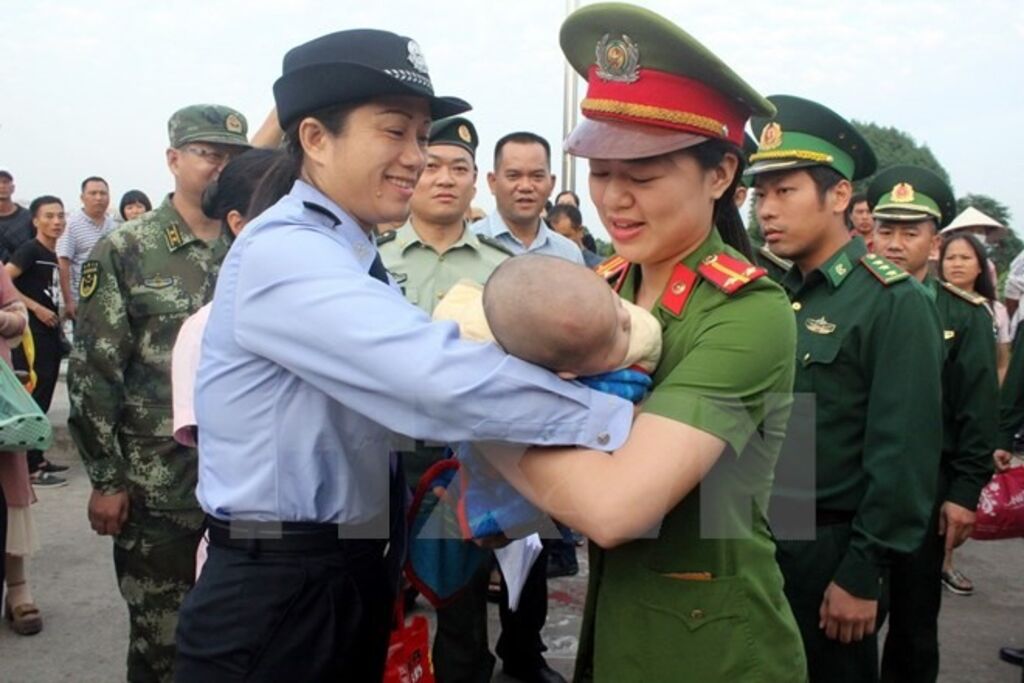 |
| Vietnamese police receive a four-month-old infant victim of human trafficking from Chinese authorities__Photo: VNA |
Passed by the National Assembly on November 28, 2024, the Law on Human Trafficking Prevention and Combat (the Law) marks a significant advancement in enhancing the effectiveness of anti-trafficking efforts, safeguarding victims’ rights, and aligning with treaties to which Vietnam is a contracting party.
With 63 articles arranged in eight chapters, the Law broadens the scope of protected individuals, additionally provides support policies and specifies prohibited acts, and helps promote international cooperation on human trafficking prevention and combat. Compared to the 2011 version, the Law has 10 new articles, revises 51, and annuls seven articles of the 2011 version.
Broader range of protected individuals
A key feature of the Law is new categories of individuals entitled to protection against trafficking. No longer limited to those officially recognized as victims, the Law now extends legal support and protection to individuals undergoing verification to be treated as victims. This change suits the practice of handling human trafficking cases where the distinction between confirmed victims and suspected individuals is often blurred.
The Law also grants protection to individuals under the age of 18 who accompany victims as well as to family members and persons accompanying victims during rescue operations, and those involved in anti-trafficking activities.
In further alignment with humanitarian principles and the ASEAN Convention Against Trafficking in Persons, especially Women and Children (ACTIP), the Law stipulates that, on a case-by-case basis, victims who commit acts in violation of law as a direct consequence of human trafficking may neither be administratively sanctioned nor criminally charged for such acts.
More support policies
Based on respect for human dignity and rights, the Law requires that support services be tailored to each victim’s age, gender, health, personal characteristics, and belief or religion, in accordance with Vietnam’s law.
When being received by competent authorities, victims or individuals undergoing identification to be treated as victims are entitled to support in terms of essential needs, medical care, psychological counseling, interpretation, legal aid and travel expenses. These measures are intended to help victims overcome initial hardships following their escape from trafficking situations.
Upon reintegration into their communities, victims may continue to receive support in education, vocational training, job counseling, and access to soft loans. This comprehensive, long-term policy approach is designed to ensure sustainable reintegration and social stability for survivors.
The Law affirms that victims and individuals undergoing identification to be treated as victims have the right to accept or refuse the above support. They are entitled to be informed of their lawful rights and interests, as well as available anti-trafficking measures. They may also request protective measures for themselves and their relatives when they are harmed, threatened with harm, or at risk of being harmed in terms of life, health, honor, dignity or property. The confidentiality of personal data, including information related to private life, family, residence, and employment, is safeguarded. Courts are required to hold behind-closed-door hearings for human trafficking cases at the request of victims or their lawful representatives.
More prohibited acts
To address emerging challenges and enhance enforcement, the Law specifies several new prohibited acts.
Among those acts, making arrangement on fetus trafficking is a form of trafficking not governed by the 2011 Law. This provision targets early-stage trafficking activities, such as making an arrangement during a woman’s pregnancy to sell her child after birth, which often involves cross-border movement and illegal transfers in exchange for money or goods. Such arrangements are now clearly defined as precursors to human trafficking.
The Law also prohibits acts of tolerating, covering up, aiding, obstructing, intervening in, failing to handle, or illegally handling human trafficking acts. Obstructing the rescue, receipt, identification, protection or assistance of victims is also deemed unlawful.
Enhanced international cooperation
Given the transnational nature of human trafficking, the Law reaffirms international cooperation as a core pillar of Vietnam’s strategy against human trafficking. In alignment with Vietnam’s Constitution and laws as well as international practices, the Law highlights the importance of coordinated inter-agency efforts and active participation in relevant international organizations, treaties and agreements.
Article 29 of the Law clearly specifies responsibilities of competent authorities in receiving information, verifying cases and coordinating the rescue of victims trafficked abroad. This provides a legal ground for Vietnamese diplomatic missions to protect citizens from labor exploitation, forced labor or fraudulent marriages overseas.
Article 31 specifies responsibilities of Vietnamese authorities in identifying, verifying and repatriating foreign victims found within Vietnam. This reflects Vietnam’s commitment to upholding international law and ensuring human rights protection without discrimination.
As per the Law, the Ministry of Public Security takes charge of proposing the conclusion of treaties, implementing bilateral and multilateral agreements, and promoting substantive cooperation with foreign countries and international organizations in the fight against human trafficking.- (VLLF)









